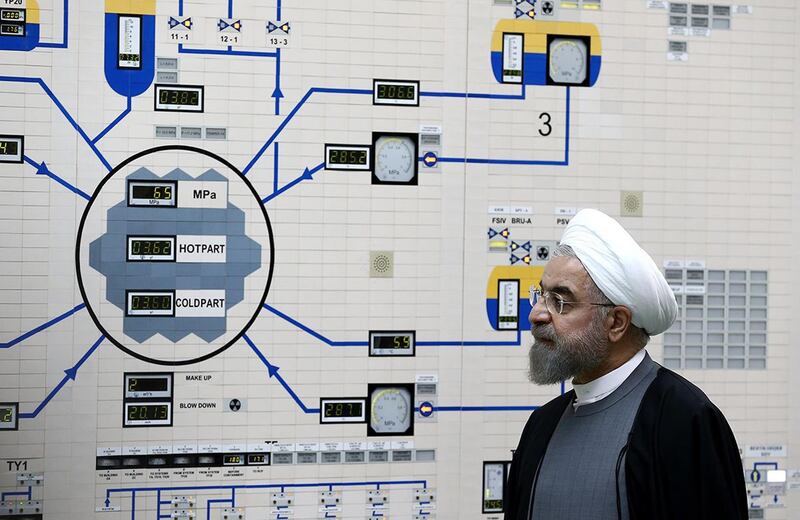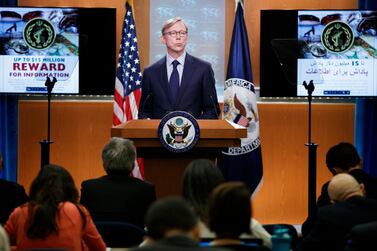The EU on Thursday demanded that Iran return to its commitments under the nuclear deal signed with world powers in 2015, after Tehran said it would end limits on its atomic research.
On Saturday, Iran's atomic energy spokesman Behrouz Kamalvandi will detail Iran's third cut to its nuclear commitments since May, in response to crippling sanctions imposed by US President Donald Trump, Isna news agency said on Thursday, .
President Hassan Rouhani said on Wednesday that the new steps included abandoning all limits in the deal to Iran's nuclear research and development.
Mr Rouhani said Iran would from Friday begin to develop centrifuges to speed up the enrichment of uranium.
Under the accord, Iran was allowed to keep restricted amounts of first-generation centrifuges at two nuclear plants.
The successful development of more advanced centrifuges would enable it to produce material for a nuclear bomb several times faster.
"The atomic energy organisation is ordered to immediately start whatever is needed in the field of research and development, and abandon all the commitments that were in place regarding research and development," Mr Rouhani said.
European Commission spokesman Carlos Ruiz de Gordejuela said in Brussels that the decision was "inconsistent" with the agreement.
"And in this context we urge Iran to reverse these steps and refrain from further measures that undermine the nuclear deal," Mr de Gordejuela said.
The remaining signatories to the agreement – Britain, France, Germany, Russia and China – are trying to keep the deal alive.
The European powers are trying to reduce tension between the US and Iran but both are hardening their stances.
In July, Iran abandoned commitments restricting its uranium stockpile and the level of uranium enrichment.
The UN's nuclear watchdog, the International Atomic Energy Agency, said on August 30 that Iran's uranium stockpile stood at about 360 kilograms, of which about 10 per cent was enriched to 4.5 per cent.
Mr Rouhani has said that the measures Iran has adopted are all readily reversible if the remaining parties to the deal honour their undertaking to provide sanctions relief.
Iran has said that a French offer of a $15 billion credit line could bring it back to full compliance with the deal.
But a senior US official on Wednesday ruled out any sanctions exemptions that would permit that credit in pre-purchase for Iran's oil.
"We can't make it any more clear that we are committed to this campaign of maximum pressure and we are not looking to grant any exceptions or waivers," said Brian Hook, the State Department's co-ordinator on Iran.
Iran's Foreign Minister Javad Zarif responded by tweeting that the US Treasury was "nothing more than a jail warden".
"Ask for reprieve, get thrown in solitary for the audacity," Mr Zarif tweeted. "Ask again and you might end up in the gallows."
Iran has expressed frustration at Europe's failure to offset the effects of the US sanctions in return for its compliance with the agreement.
Mr Rouhani on Wednesday gave Europe a 60-day ultimatum before Iran drops another commitment.
The US admitted on Wednesday that Mr Hook personally offered several million dollars to the Indian captain of an Iranian oil tanker suspected of sailing to Syria.
The Financial Times reported he sent emails to captain Akhilesh Kumar in which he offered "good news" of millions in US cash to live comfortably if he steered the Grace 1, which has been renamed Adrian Darya 1, to a country where it could be seized.
"We have seen the Financial Times article and can confirm that the details are accurate," a State Department spokeswoman said.
"We have conducted extensive outreach to several ship captains as well as shipping companies warning them of the consequences of providing support to a foreign terrorist organisation," she said, referring to Iran's Islamic Revolutionary Guard Corps.
On Wednesday, the British Foreign and Commonwealth Office said Iran's preparation to drop another commitment to the deal was "deeply concerning".






